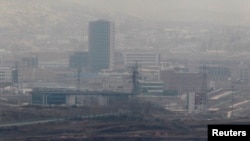North and South Korea have agreed to reopen a jointly-run industrial park just inside the North Korean border on a trial basis starting next Monday.
The South's Unification Ministry says negotiators reached the deal on the Kaesong industrial complex following lengthy negotiations that lasted through early Wednesday.
The two sides tentatively agreed last month to re-open the facility, which was effectively closed by the North in April. But the South was still looking for compensation for its companies hit by the closure and for assurances a shutdown would not happen again.
The South's statement said the two sides agreed that South Korean companies would not pay taxes for this year. They also agreed to open the complex to foreign investors, which could make it harder to shut down operations in the future.
North Korean state media confirmed the September 16 re-opening date, but offered no other details.
Troy Stangarone, the Senior Director of the Korea Economic Institute of America, tells VOA the deal is an important step for Korean relations. But he is skeptical that international companies will want to invest in Kaesong under the current circumstances.
"The challenge is going to be that most of these companies are going to want to see how the process moves forward," he said. "Are there any real assurances that the North Koreans will (keep) the complex open?"
North Korea pulled its 53,000 workers from Kaesong in April. It blamed rising tensions from joint U.S.-South Korean military exercises. It was also angry over expanded U.N. sanctions in response to its third nuclear test.
Since 2004, Kaesong has been an important symbol of cooperation between Seoul and Pyongyang, which remain in a technical state of war since their 1950s conflict ended only in a truce.
Over 120 South Korean businesses use Kaesong to manufacture a variety of products with cheap North Korean labor. In turn, the industrial park serves to provide vital foreign currency to the impoverished North.
Stangarone says the loss of this cash was likely a motivation for North Korea in re-opening the factory. But he says Pyongyang was also eager to find jobs for its workers.
"While they found many of them jobs within North Korea, these jobs were not as high of quality. Conditions were not as good, the pay was not as good," he said. "There's an important domestic reason for this as well beyond the international hard currency they earned from the project."
Wednesday's announcement is the latest sign of easing tensions on the Korean peninsula. Last month the two Koreas also agreed to resume stalled talks on reuniting families forcefully separated six decades ago by the Korean War.
Last week, the North also restored a military hotline on the countries' tense, heavily armed border that was severed at the height of this year's tensions.
The South's Unification Ministry says negotiators reached the deal on the Kaesong industrial complex following lengthy negotiations that lasted through early Wednesday.
The two sides tentatively agreed last month to re-open the facility, which was effectively closed by the North in April. But the South was still looking for compensation for its companies hit by the closure and for assurances a shutdown would not happen again.
The South's statement said the two sides agreed that South Korean companies would not pay taxes for this year. They also agreed to open the complex to foreign investors, which could make it harder to shut down operations in the future.
North Korean state media confirmed the September 16 re-opening date, but offered no other details.
Troy Stangarone, the Senior Director of the Korea Economic Institute of America, tells VOA the deal is an important step for Korean relations. But he is skeptical that international companies will want to invest in Kaesong under the current circumstances.
"The challenge is going to be that most of these companies are going to want to see how the process moves forward," he said. "Are there any real assurances that the North Koreans will (keep) the complex open?"
North Korea pulled its 53,000 workers from Kaesong in April. It blamed rising tensions from joint U.S.-South Korean military exercises. It was also angry over expanded U.N. sanctions in response to its third nuclear test.
Since 2004, Kaesong has been an important symbol of cooperation between Seoul and Pyongyang, which remain in a technical state of war since their 1950s conflict ended only in a truce.
Over 120 South Korean businesses use Kaesong to manufacture a variety of products with cheap North Korean labor. In turn, the industrial park serves to provide vital foreign currency to the impoverished North.
Stangarone says the loss of this cash was likely a motivation for North Korea in re-opening the factory. But he says Pyongyang was also eager to find jobs for its workers.
"While they found many of them jobs within North Korea, these jobs were not as high of quality. Conditions were not as good, the pay was not as good," he said. "There's an important domestic reason for this as well beyond the international hard currency they earned from the project."
Wednesday's announcement is the latest sign of easing tensions on the Korean peninsula. Last month the two Koreas also agreed to resume stalled talks on reuniting families forcefully separated six decades ago by the Korean War.
Last week, the North also restored a military hotline on the countries' tense, heavily armed border that was severed at the height of this year's tensions.







